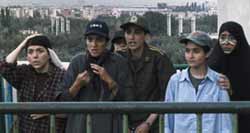
The teenage girls in Jafar Panahi’s new film Offside have a seemingly simple mission: To make it inside the World Cup qualifying match between Iran and Bahrain. But because women are strictly forbidden from entering the stadium, these girls must dress up like boys and dodge a phalanx of soldiers in order to make it inside. Inspired by the director’s own daughter’s experience, Offside—opening Friday, April 20 in the Bay Area and in limited release nationwide—takes the gender rules at a soccer stadium and turns it into a funny, affecting discussion about the strict and ludicrous set of forbidden activities that rule Iranian life.
Shot cinema verite style, the opening scenes of the film take us inside the growling, predominantly male world of soccer fanatics in Tehran, crowding buses, cheering on street corners, waving flags and entering the stadium by the thousands. As the camera looks more closely at the faces in the crowd, some of those apparently male soccer fans become female, quietly disguised, but cheering just as enthusiastically. A handful of them slip easily into the stadium and disappear from the camera’s gaze.
Six other girls, dressed in baggy clothing and caps, some with the Iranian national flag painted on their faces, manage to infiltrate the game but are caught by soldiers early on and kept in a holding pen inside the stadium. The girls must endure merely listening to the game they risked so much to see, but implore their guards to narrate it for them. As one girl explains, “I’m at the sea. If I can’t have fresh fish at least give it to me canned.”
Panahi shot these scenes surreptitiously at the actual Iran/Bahrain game, and the soaring sounds of the crowd punctuate the girls’ dialogue inside the holding pen. Despite the bold, witty attitudes of the girls—when one of the guards explains that women cannot enter because men are liable to say distasteful things unsuitable for their ears, one girl replies, “we won’t listen”—there is a real sense of the risk they have taken. As more and more time lapses in their makeshift jail, the girls grow increasingly anxious about the potential consequences of their actions (not only from the military but from their own families) and beg to be let out.
Yet, ultimately Panahi prefers a lighter touch and Offside is mainly comedic, highlighting the absurdities of Iranian rules that keep men and women separate. Most affecting is the evolving camaraderie between the girls and their guards. The girls, never mentioned by proper name, mock the soldiers and challenge the arbitrary rules they are bound to uphold. But their captors are restricted in their own way too, forced to do military service when they would rather be, at least in the words of one character, herding cows. What is most powerful about these scenes is that the sweet, platonic bond that develops between the soldiers and the girls stands in stark contrast to the official presumption that men and women can’t safely enjoy a soccer match together.
As the game comes to an end, the girls are led onto a minibus and driven through the streets of Tehran to an unknown fate. After being so close to the game, they are suddenly forced to hear its ending on a car radio. Even here, Panahi manages to wrestle the light out of a gloomy predicament, ultimately turning the girls’ experience into a kind of triumph.
Still Offside, for all its humor, has something quite serious in mind: the pain of being an outsider in one’s own country. Panahi’s last film, The Circle, also dealt with the restricted position of women in Iranian life and his questioning films have made him increasingly unpopular with Iranian authorities. Though he still works in Iran, his films have yet to be shown there. Here’s hoping that someday Offside gets a screening in Tehran.















